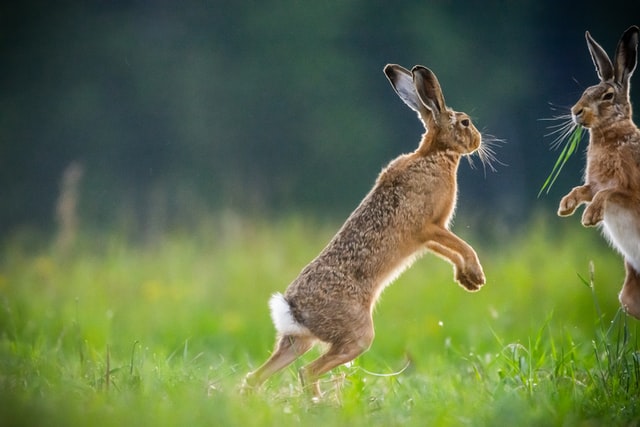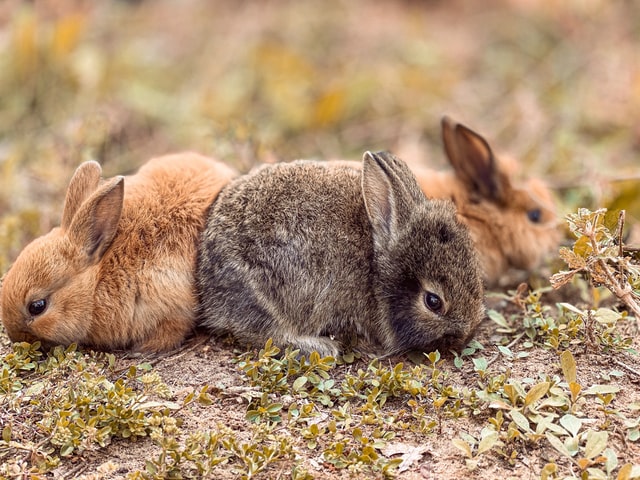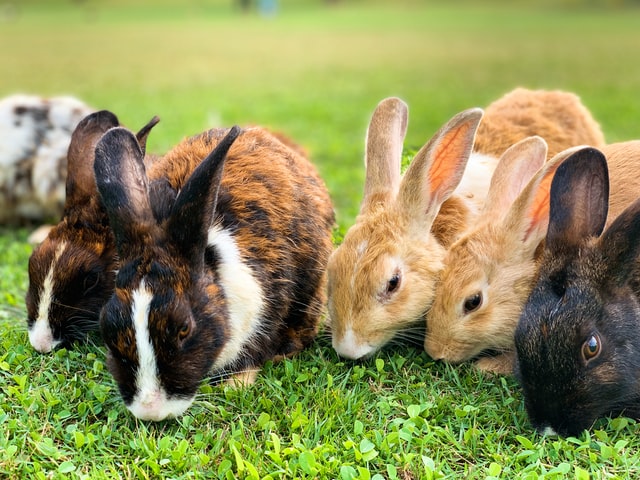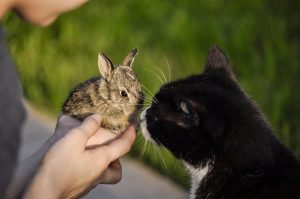
“Even rabbits bite when cornered.” Though this Chinese proverb warns against underestimating what people are capable of when they’ve got no other choices, it can be applied to the rabbits literally across many different scenarios. As the parents of bunnies, you probably already know that it is best for their mental health to keep them accompanied by other bunnies. Hell, chances are you are already keeping two or more of these cute little guys.
As with humans, when rabbits have roommates, sometimes there is drama, there is friction, and sometimes there is chemistry. Or maybe there are all types of things going on at once. And certainly not helping with your headaches, sometimes, rabbits fight. And I mean fight. As we will see soon, it is not just the possible injuries we should be worried about. A fight can have significant impact on our bunnies’ mental health if it isn’t dealt with properly.
In this blog post, we are diving into the most common reasons for bunny fights and what you, as their loving parents, can do to improve their relationship. Let’s get straight to the point.
Contents
Not friends yet
Although rabbits are by instinct social animals, these fur balls don’t necessarily get along with just any other bunny. Rabbits, like other animals, can be territorial and may see other members of the same sex as competitors rather than friends. According to Britannica, certain rabbits form mainly reproductive pairs in the wilderness. That is to say, unless when getting your bunnies they have been companions already, any new friends you brought for your rabbit are going to take some getting used to. This will naturally result in fights in most cases.
So how do you help your rabbits get along? Here are some tips for helping your bunnies bond. According to Rabbit Haven, it is a common and recommended practice to have your rabbits neutered before putting them together. While the hormonal transitions are underway, which takes 3 to 4 weeks to complete, it may be best to keep your bunnies separated to prevent crossfire.
As already mentioned, rabbits tend to naturally choose a companion of the opposite sex, so it is also recommended that you try to stick to the rules of nature. In general, people have found that both male-rabbit pairs and female ones are harder to make friends compared to male-female pairs. Another advice the experts at Rabbit Haven gives is to pick a neutral territory if you are getting a new bunny for your existing one. This might help mitigating their territorial instincts.
In addition, like humans, the youths may not get along too well with the older generations. So that is another bunny demographic to look out for when adopting your fluffy pets. Though trying to help your rabbits bond by yourself is commendable, sometimes it might just require a pair of professional hands to do the trick. If you are finding this process too frustrating, without much improvement over time, you might consider letting the people at the shelter be your pet bunnies’ “matchmaker”.
Friends can fight, too

So now your pointy-eared cuties have become friends and start to show friendly behaviors, including helping each other groom, lying down on the side, and—here are two weird ones that may sound weird to us by their phrasing—turning their backs to each other and mutual ignoring. Happily ever after, yes? Not exactly. Our rabbit friends are pretty sensitive, so even after they get acquainted among themselves, there are still quite a few reasons why they might fight one another.
Hormones
As mentioned above, as rabbits mature, they can become more territorial and get protective around other rabbits. According to Rabbit Welfare Association & Funds, if your rabbits get too excited and aggressive with one another, it might be due to hormonal reasons and neutering or splaying might help. But it is not always chemical.
Discomforts, fear and pain
Maybe it is due to self-defensive instinct, but rabbits, among other animals, can fight other rabbits when they are hurt, afraid, or generally uncomfortable, which may be felt as stress. If you know your bunnies have been neutered and bonded, but the fighting is not stopping, then it’s time to inspect the environment for possible suspects.
Pain can be identified by examining your pets physically. But general discomforts might be less easy to spot. For example, if the rabbits’ living environment is not clean enough, they may develop some pretty gruesome skin problems, which may cause significant discomfort and stress, making them more jumpy around their friends.
Even other more minuscule things like the amount of water and food or the size of their home can be a source of stress and a reason to fight for our rabbit friends. High maintenance, yes. But we love them.
Your rabbits may be trying to dominate
Dominance hierarchy is a prominent structure in the animal world. Rabbits are no different. If one of your rabbit is smaller and weaker, then the other one might try to assert its dominance. Therefore it is actually another recommendation when choosing your rabbits to bond, you try to go for ones similar in size.
But even when you do, if one of your rabbits fell sick, the other one might still leap at the chance. By now, you may be getting nervous: It sounds like there are a lot of potential discords among rabbits, maybe it’s not a good idea to keep them as pets? Don’t make haste. Sometimes, they may just be playing.
Playing vs. Fighting
For those of you who are familiar with the upbringing of animals, you surely know that play is a significant part of any species’ cubs, and sometimes play can look to our eyes like a whole lot like fighting. Here are some playing behaviours: nipping without damaging or scaring the other rabbit, light boxing that’s not leaving any claw marks, stalking one another, mounting on each other. With the more aggressive-looking ones like boxing and nipping, as long as they retreat and the actions don’t escalate, a fight is probably not on the way.
On the other hand, if you observe chasing, biting, low grunts and any behaviour that looked too rough and was causing distress in the other rabbit, be alarmed that a fight is underway. Now you should do something.
Stopping the fight

By now you must’ve noticed that while a lot of the reasons behind fighting could be addressed properly, these solutions we laid out are mostly long-term preventive or protective measures. But what should you do when a fight is ongoing? You may ask. Well, the reason for a lot of these fights are due to a sensitive nature of our beloved bunnies, but their sensitivity might also be used to stop them from fighting.
We are talking about distractions. Sudden, loud noises might shock your rabbits so much that they’d forget about fighting and get into a timid mode. Yes, yes, I know it is not exactly a nice thing to do, but bunny fights can cause serious damage to themselves. They may be scared at the moment, it is better than them getting seriously hurt, isn’t it?
That said, there are some alternatives you can try. If you are close enough and have some kind of petition on hand—a cardboard, a book, a magazine, or a designated fence—you can physically separate them to stop the fight. But never use your hand—those claws and teeth can cause some real damage, and they are not exactly bacteria- and virus-free.
And it is perhaps the best to keep them separated while you investigate what caused the fight in the first place. After you’ve stopped the fight, remember to always check your rabbits for injuries resulting from the fight, because when these little guys fight, they mean serious business. If, after investigation, you are still unsure about what caused the fight, the best action is to take them to the vet and pick the expert’s brains.
With all our advice on spotting signs of fighting, reasons for fighting, and how to stop the fight once it has started, the best practice regarding fighting is to do all you can to try and prevent it in the first place. You may have seen cats and dogs fight amongst themselves and remain friends after, but rabbits aren’t so forgiving. In fact, rabbits are known for holding grudges after being mistreated. If two bonded rabbits fight too much, they will distance from each other and end up estranged as if they have not formed that bond to begin with.
And bunnies don’t really discriminate with their grudges, since if their owner did something to upset them, just you observe, their behavior will change after. So high maintenance they may be, take care of these sensitive little fur balls. And that includes helping them not get hurt from fights, prevent them if you can—that is perhaps the best course of action.
(When unsure, maybe just treat them like royalty. Just saying.)





